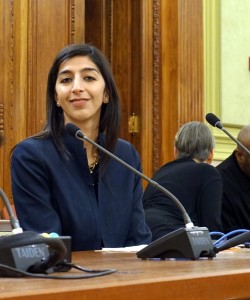On Thursday, the DC council held an historic hearing on street harassment. This was the testimony of our board member Layla Moughari.

Good morning, Committee members. My name is Layla Moughari. I am a resident of Ward One and a member .of the Stop Street Harassment Board of Directors. Thank you for the opportunity to speak at this roundtable.
I’m here to request that you take action against street harassment.
Many people see street harassment as harmless, and a fact of life. But street harassment can be terrifying and inhibit mobility, and there’s always a possibility that street harassment can escalate into violence or sexual assault.
In the 10 years I’ve lived in DC, street harassment has been a regular feature in my life. There have been times I’ve experienced it daily.
In Columbia Heights, I’ve experienced several aggressive and upsetting interactions. On one occasion, two men shouted obscenities at me because I didn’t respond to their advances. Another time, someone grabbed me as he rode past me on his bike.
And in another situation I was alone, walking to the gym at 6 o’clock in the morning. It was pitch black out and no one was around. I heard someone hissing at me. I looked around and couldn’t see anyone. The hissing continued but closer this time. I realized that someone was following me, getting closer to me, but hiding from me. I was alone in the dark. When the hissing continued, I felt that I was in imminent danger and completely helpless. I started to run and scream down the street. A concerned neighbor asked if I was OK. I was still scared, but I felt better instantly.
I skipped the gym that morning, and never felt safe walking home again. In fact, the harassment I experienced in Columbia Heights contributed to my decision to move from the neighborhood in 2012 after living there five years.
Unfortunately, this experience is not unique to me as is evident by the others here today and the many people who submit their stories to the CASS and Stop Street Harassment blogs. A national study commissioned by SSH found that two-thirds of women and one-quarter of men had experienced gender-based harassment in public spaces.
While some research exists on street harassment, we lack concrete data for DC and are limited in what we know about the rates, causes and consequence of street harassment here in the District, as well as the best practices for combating it.
I request that the city council assist in collecting data so we can better understand the scope of the problem and where specifically it happens. Then, once we understand the issue more, I hope the city council can work with local organizations on non-criminalizing, community-based solutions such as public awareness campaigns.
I hope that one day street harassment will be viewed the same way workplace sexual harassment is largely seen now, recognized by our culture as disrespectful, inappropriate, and harmful. Workplace sexual harassment was also accepted as normal not long ago. But with research, policies, laws, enforcement of the rule of law, and culture change, workplace harassment is much less pervasive today.
